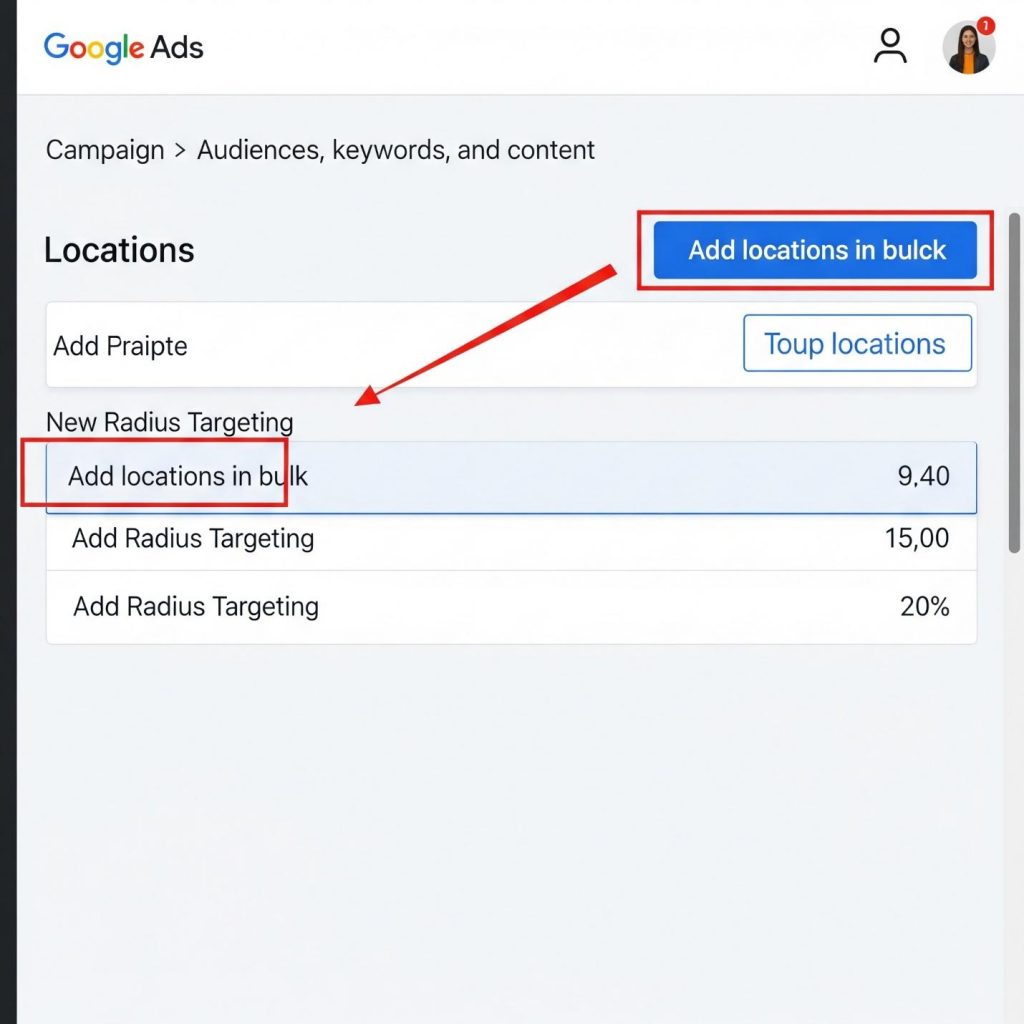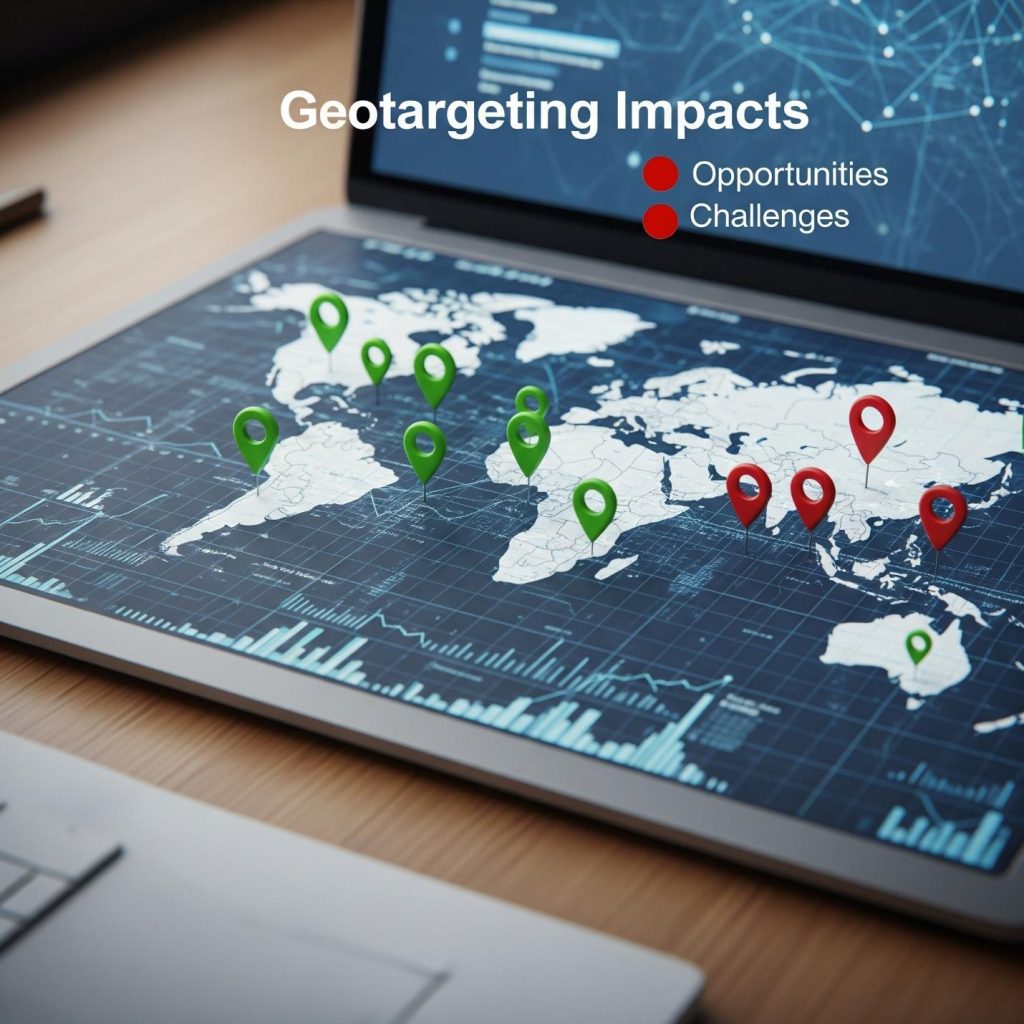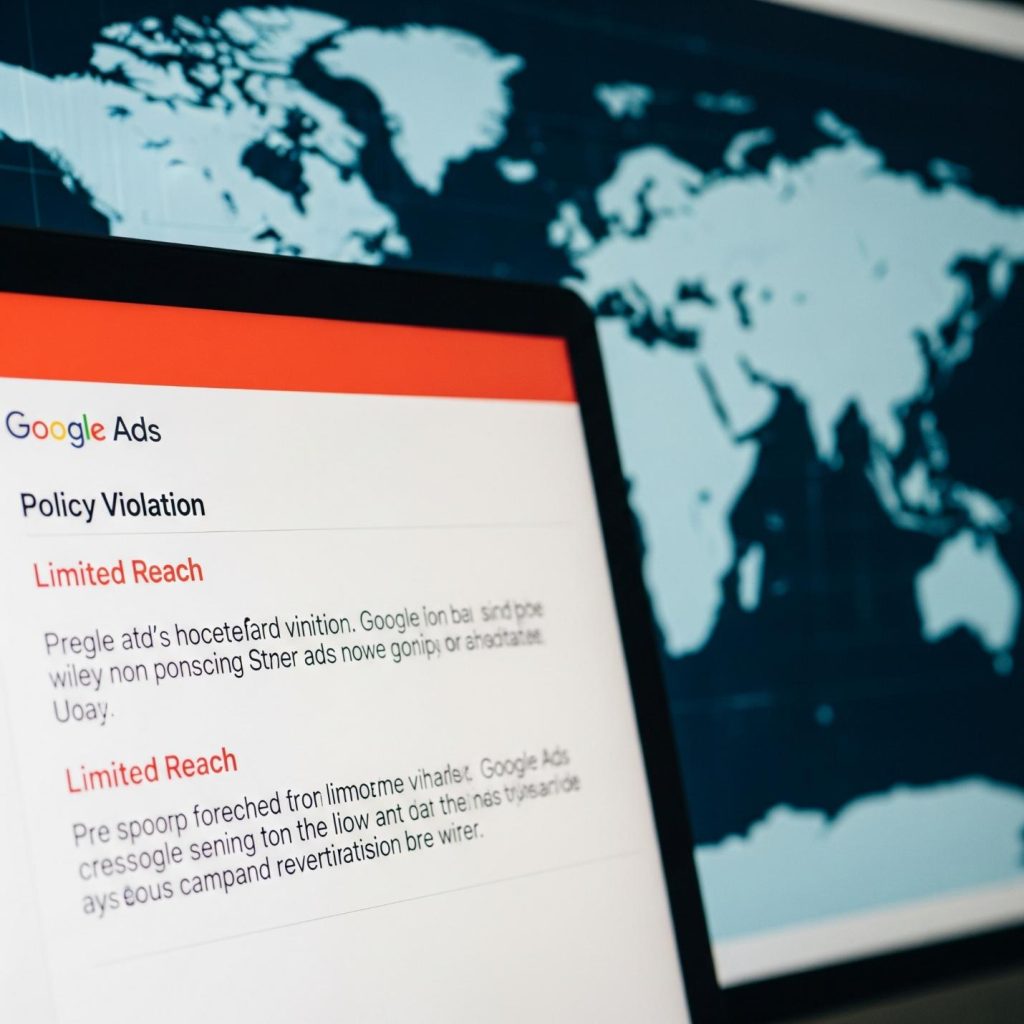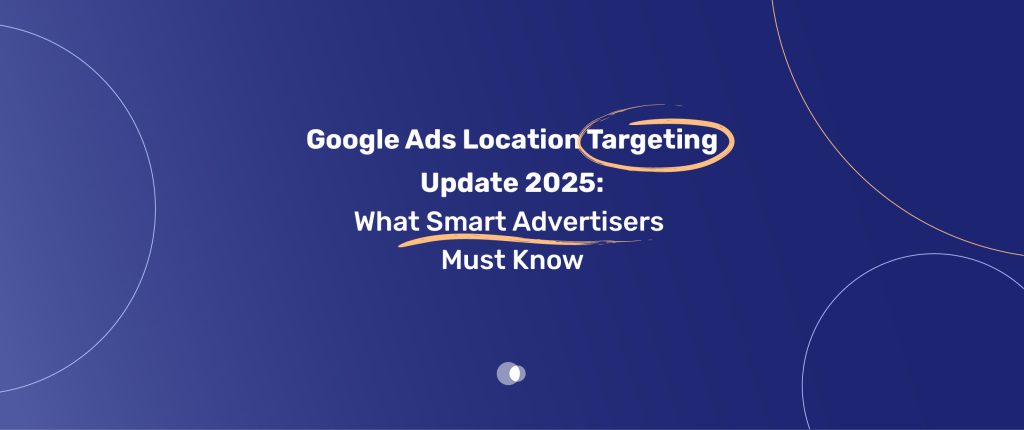If you’re new to pay-per-click (PPC) advertising or looking to sharpen your skills, understanding the structure of Google Ads is like learning the rules of a game before you play. Think of it as organizing a toolbox: every piece—your account, campaigns, ad groups, keywords, and ads—has a specific job. Get this right, and you’ll stretch your budget, reach the right people, and see your campaigns shine. That’s why many businesses turn to a Google Ads agency Dubai to set up and manage their account structure professionally and efficiently.
Table of Contents
The Google Ads Location Targeting Update 2025 introduces a revamped interface, AI-driven enhancements, and new tools like bulk location uploads, all aimed at streamlining large-scale campaigns while pushing for hyper-accurate targeting. However, the overhaul also brings challenges, such as the removal of intuitive map previews and relocated radius targeting, which could disrupt workflows for local businesses and agencies. These changes make it even more important for advertisers—especially those planning to buy Google Ads account—to understand how location settings impact reach and performance.
This guide dives deep into the 2025 updates, offering actionable insights for advertisers, from international brands to local firms in Dubai. Whether you’re partnering with an international AdWords agency or handling AdWords management Dubai, understanding these changes is key to staying ahead.
We’ll explore the updates, their implications, strategic best practices, and how to avoid pitfalls like Google Ads account suspension due to misconfigured targeting. Let’s unpack what smart advertisers need to know to thrive in this AI-powered advertising landscape.
What’s New in Google Ads Location Targeting for 2025?
Google’s 2025 location targeting update, first detailed in industry reports like PPC News Feed, reflects a shift toward scalability and AI integration. The changes streamline workflows for large campaigns while introducing complexities for precision targeting. Here’s a breakdown of the core updates, drawn from the latest insights:

Revamped Advanced Location Targeting Interface
Google has overhauled the Advanced Location Targeting interface, prioritizing efficiency for multi-region campaigns:
Removed Features:
- The Advanced Search option and map previews are gone from the main panel, making it harder to visualize targeted areas instantly. Advertisers in Dubai, for instance, can no longer quickly confirm if their ads cover specific areas like Jumeirah or Downtown without diving into deeper menus.
Relocated Radius Targeting:
- Previously a staple of local campaigns, radius targeting is now accessed via Campaign > Audiences, keywords, and content > Locations. This shift adds steps to the setup process, impacting businesses like restaurants or clinics in Dubai that rely on proximity-based targeting.
Bulk Location Addition:
- A new “Add locations in bulk” button allows advertisers to upload up to 1,000 locations (cities, postal codes, or regions) at once. This is a game-changer for international AdWords agencies managing campaigns across the UAE, GCC, or global markets, saving hours of manual input.
AI-Powered Targeting Enhancements
Google’s AI-first vision, showcased at Google Marketing Live 2025, drives several new features:
Bidding Exploration:
- This tool automatically lowers target ROAS by 10% to test new geographic markets, potentially uncovering untapped audiences in areas like Abu Dhabi or Sharjah for Dubai-based businesses. However, it risks budget waste if landing pages aren’t optimized for new regions.
Search Max (AI Max for Search):
- In beta, this feature uses AI to identify location-specific long-tail keywords (e.g., “luxury car rental Dubai Marina”) that manual research might miss. It’s ideal for google ads optimization services dubai, where niche searches are common.
Locations of Interest:
- Part of AI Max, this allows targeting users based on their search intent for a location, even if they’re not physically there. For example, a Dubai travel agency can target U.S. users searching for “Dubai vacation packages.”
AI Overviews Integration:
- Ads now appear in AI-generated responses for location-specific queries, boosting visibility for complex searches like “best co-working spaces in Dubai 2025.”
Demand Gen Campaign Updates
The new Demand Gen campaign type, replacing Video Action campaigns, introduces location targeting at the ad group level, offering granular control. A standout feature is the integration of Google Maps inventory via Promoted Pins, which display business details (name, logo, hours, offers) to users browsing maps.
For Dubai retailers or restaurants, this can drive foot traffic to physical locations like Dubai Mall or Sheikh Zayed Road, with unified tracking of online and in-store conversions.
Push for Precision Targeting
Google now flags campaigns set to “All Countries and Territories”, urging advertisers to narrow their focus. For local businesses, selecting “Presence” (people physically in the target area) over “Presence or Interest” is critical to avoid irrelevant clicks, especially in markets like Dubai where geographic precision drives conversions.
Implications for Advertisers
The 2025 updates reshape how advertisers approach location targeting, with both opportunities and challenges. Here’s how they impact campaign management, particularly for those focused on Google Ads management in Dubai:

Workflow Disruptions
The removal of map previews and Advanced Search adds complexity to campaign setup. Agencies handling multiple accounts, such as an international AdWords agency in Dubai, must update workflows and train teams to navigate the new interface.
For example, setting a 5-mile radius around a Dubai clinic now requires extra clicks, slowing down processes and risking errors.
Budget Efficiency
Default settings like “All Countries and Territories” or “Presence or Interest” can drain budgets with low-value clicks. In Dubai’s competitive market, where CPCs for keywords like “real estate” can exceed $5, precise targeting (e.g., specific postal codes or neighborhoods like Business Bay) is essential to maximize ROI.
Opportunities for Local Businesses
Features like Promoted Pins and AI Overviews open new doors for Dubai-based businesses. A café in Al Barsha can use Promoted Pins to attract map-browsing customers, while AI Overviews can highlight it in searches like “best coffee shops near me.”
These tools, combined with Google Ads optimization in Dubai, can boost visibility in a crowded market.
Risks of AI-Driven Expansion
AI features like Bidding Exploration and Search Max expand reach but require careful monitoring. Without optimized landing pages, targeting new regions like Ras Al Khaimah could lead to high bounce rates.
Additionally, misconfigured campaigns risk Google Ads account suspension due to policy violations, such as targeting restricted regions.
| Change | Impact | Action Required |
| Bulk Location Addition | Saves time for multi-region campaigns | Prepare accurate location lists |
| Removed Map Previews | Increases setup time and error risk | Use external mapping tools |
| AI Max for Search | Uncovers niche geo-specific keywords | Optimize landing pages for new keywords |
| Promoted Pins on Google Maps | Drives in-store visits | Link Google Business Profile |
Strategic Best Practices for 2025
To leverage the Google Ads Location Targeting Update 2025, advertisers must adapt workflows, embrace AI tools, and prioritize precision. Here are actionable strategies, tailored for markets like Dubai:

Override Default Settings
Google’s default “All Countries and Territories” setting is a trap for local businesses. Always select “Enter Another Location” and use Advanced Search to target specific areas. For Dubai advertisers, focus on neighborhoods like DIFC or Deira, and choose “Presence” to ensure ads reach physically present users.
This prevents budget waste on irrelevant clicks from users outside your service area.
Master Bulk Location Uploads
For campaigns spanning multiple regions, use the “Add locations in bulk” feature. Prepare a spreadsheet with cities, postal codes, or regions (e.g., Dubai, Abu Dhabi, Sharjah) and upload it to save time.
International AdWords agencies can streamline global campaigns by batching locations, but double-check lists to avoid errors that could trigger Google Ads account suspension for policy violations.
Leverage AI-Powered Features
Bidding Exploration:
- Test new markets cautiously, ensuring landing pages are optimized for new regions. For example, a Dubai real estate firm expanding to Ajman should tailor its website for local queries.
AI Max for Search:
- Activate this for campaigns targeting niche keywords. A Dubai luxury retailer could uncover terms like “designer handbags Bur Dubai” to boost conversions.
Locations of Interest:
- Use this for industries like tourism. A Dubai hotel can target UK users searching for “Dubai 5-star hotels” to capture early-stage planners.
Integrate Google Maps and Location Assets
Link your Google Business Profile to Google Ads to enable Location Assets, displaying store details in ads. For Dubai businesses, Promoted Pins on Google Maps can attract high-intent users browsing nearby.
Track in-store visits using Google’s Store Visits Measurement to measure ROI, especially for retail or hospitality in areas like JLT or Marina.
Localize Ad Copy and Landing Pages
Tailor ads and landing pages to specific locations. A Dubai car rental service should use headlines like “Rent a Car in Dubai Marina” and include local landmarks on landing pages. This builds trust and boosts conversions, aligning with Google Ads optimization in Dubai best practices.
Monitor and Optimize Continuously
Check performance metrics in the Locations tab weekly. Adjust bids for high-performing areas (e.g., increase bids for Downtown Dubai) and exclude low-value regions via Negative Locations. Use Google Analytics to analyze geo-specific bounce rates and refine landing pages.
This data-driven approach prevents budget waste and supports Google Ads management in Dubai.
Avoid Account Suspension
Misconfigured location targeting, such as violating geographic restrictions, can lead to Google Ads account suspension. Regularly review Google’s policies in the Policy Center and ensure compliance, especially for sensitive industries like healthcare or finance in Dubai.
If suspended, work with an international AdWords agency for Google Ads account suspension recovery to restore access swiftly.
Challenges and How to Overcome Them
The 2025 updates bring challenges that require proactive management:
No Map Previews:
- Without visual confirmation, errors in targeting are more likely. Use external tools like Google Maps or verified location lists to confirm boundaries before uploading.
Relocated Radius Targeting:
- The new path slows down local campaign setup. Train teams to access Campaign > Audiences, keywords, and content > Locations and document the process in updated SOPs.
Limited Reach in Small Areas:
- Targeting tiny radii (e.g., 1 km) may result in intermittent ad delivery. Expand to a viable radius (e.g., 5 km) and use negative locations to refine.
AI-Driven Budget Risks:
- Features like Bidding Exploration can overspend in unprofitable regions. Set strict budgets and monitor performance daily to course-correct.

Conclusion: Seizing Opportunities in 2025
The Google Ads Location Targeting Update 2025 marks a pivotal shift toward AI-driven precision and scalability. While the revamped interface and relocated features like radius targeting pose challenges, tools like bulk location uploads, Promoted Pins, and AI Max offer unprecedented opportunities.
For advertisers in Dubai, where competition is fierce, mastering these updates is non-negotiable. By rejecting default settings, leveraging AI tools, and localizing campaigns, businesses can drive hyper-relevant traffic and boost ROI.
Partnering with an international AdWords agency or focusing on Google Ads optimization in Dubai can amplify success. Regularly monitor performance, update workflows, and stay compliant to avoid issues like Google Ads account suspension.
The advertisers who adapt swiftly—balancing AI automation with human oversight—will gain a competitive edge in 2025’s dynamic advertising landscape.
Frequently Asked Questions
What is the Google Ads Location Targeting Update 2025?
It’s a March 2025 update that revamps the location targeting interface, adds bulk location uploads, relocates radius targeting, and introduces AI-driven features like Bidding Exploration and Promoted Pins.
How does the bulk location feature work?
Advertisers can upload up to 1,000 locations (cities, postal codes, or regions) at once via a spreadsheet, streamlining multi-region campaign setup.
Why were map previews removed?
Google simplified the interface to prioritize scalability, but this increases reliance on external tools for visual confirmation of targeted areas.
How can Dubai advertisers benefit from these updates?
Features like Promoted Pins and AI Max help Dubai businesses target local customers precisely, driving foot traffic and uncovering niche keywords for Google Ads management in Dubai.
How do I avoid Google Ads account suspension with location targeting?
Follow Google’s geographic policies, use precise targeting, and monitor compliance. If suspended, seek Google Ads account suspension recovery through an international AdWords agency.



